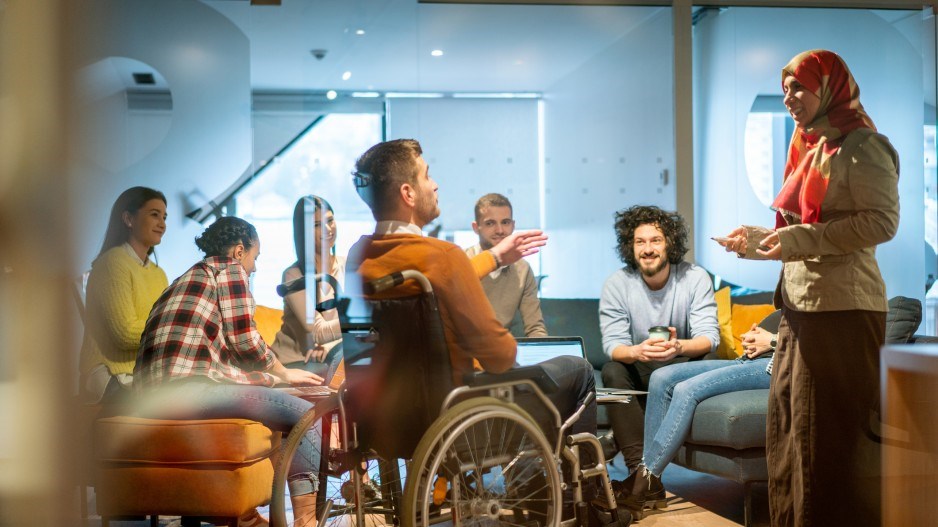For many Canadians who do not live with a disability, the level of preparedness of our country may seem superior to what is observed in other places around the world. About two-thirds of British Columbians told Research Co. and Glacier Media that they were satisfied with how Canada (65 per cent), their municipality (also 65 per cent) and the province (68 per cent) are equipped to assist people with disabilities.
The results are not as encouraging when we focus on the opinions of British Columbians who live with a disability. The level of satisfaction with the way the province works drops to 60 per cent. The numbers are lower for the country (57 per cent) and municipalities (54 per cent).
It is evident that more work needs to be done to address how cities and towns operate. The way we move has evolved over the past quarter century, aided by special parking zones and chirping crosswalks. Ensuring that urban areas are friendly for residents with learning disabilities or those more likely to experience sensory overload is also a responsibility that mayors and councils need to take seriously. Right now, just over half of British Columbians with a disability think about their daily routine and find their experience gratifying.
The disconnect on the supposed superiority of our amenities is also present on other venues. Three in five British Columbians are satisfied with how universities (60 per cent) and parks and beaches (also 60 per cent) are equipped. For those who live with a disability, the ranking drops to 52 per cent and 53 per cent respectively.
The differences are staggering when British Columbians rate stores and malls: 71 per cent of all respondents are satisfied with what has been done, but only 57 per cent of those living with a disability concur.
Still, the most startling finding is related to office life. Only 46 per cent of British Columbians with a disability are satisfied with the way workplaces are equipped to assist people with disabilities. This leaves more than a third (35 per cent) who may not completely look forward to a day’s work because of inadequate facilities.
On a couple of areas, the survey is reassuring. More than a quarter of British Columbians who live with a disability (27 per cent) had access to quiet areas in a workplace or school when needed, and more than one in five (22 per cent) were provided with special supports to complete their work or studies. Respondents aged 18 to 34 were more likely to have gone through each of these experiences than their older counterparts.
We also have some undesirable findings: 34 per cent of British Columbians who live with a disability telling us they were negatively stereotyped or judged by colleagues because of their disability, and 22 per cent saying they had difficulty entering a workplace or school because of improper facilities.
Fewer than three in 10 British Columbians who live with a disability experience three types of barriers “all of the time” or “most of the time:” Architectural and physical (28 per cent), informational or communications-related (27 per cent) and technological (23 per cent). Examples of these setbacks include not being able to access a building or outdoor space, or lacking assistive devices to properly take part in an assignment.
For at least a third of British Columbians who live with a disability, two types of barriers are more prevalent: Systemic (33 per cent) and attitudinal (34 per cent). These barriers include policies that unfairly prevent individuals from participating fully in a situation, or the behaviour of other humans whose assumptions end up becoming discriminatory.
Our survey may provide some relief in the partial progress that has been achieved on infrastructure and some forms of accommodation. Unfortunately, the biggest hindrance continues to be discrimination, both in our behaviour as humans and in the policies that fail to take everyone into account. When a third of British Columbians who live with a disability recall facing each of these difficulties “all” or “most” of the time, we are not where we could be as a society.
Mario Canseco is president of Research Co.
Results are based on an online study conducted from Sept. 17-19 among 800 adults in B.C. The data has been statistically weighted according to Canadian census figures for age, gender and region in B.C. The margin of error is plus or minus 3.5 percentage points, 19 times out of 20.



